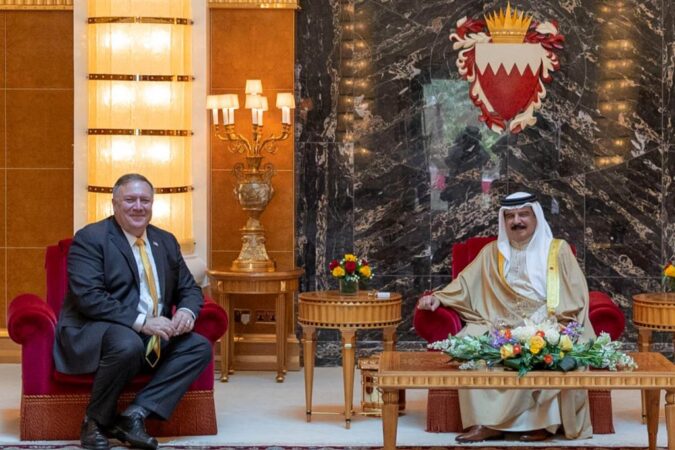The United States, Bahrain, and Israel have struck a deal to normalize relations between the two Middle Eastern countries on September 11, just four weeks after a similar deal made the United Arab Emirates the first Gulf country to recognize the Jewish state.
In a joint statement, the agreement is framed as building on the “Peace to Prosperity” workshop that Manama hosted with the White House last year, where business leaders from across the region met to “advance the cause of peace, dignity, and economic opportunity for the Palestinian people” as part of the Trump administration’s “Deal of the Century” for Israeli-Palestinian peace. The announcement also states that Israel has agreed to welcome all Muslims who wish to pray and worship at Al Aqsa mosque in Jerusalem.
On September 15, Bahrain’s Foreign Minister Abdullatif Al Zayani will join a signing ceremony at the While House with President Donald Trump, Prime Minister Benjamin Netanyahu, and UAE Foreign Minister Sheikh Abdullah bin Zayed, where the agreements Israel has struck with the two Gulf states will become formalized.
With US withdrawing, regional actors look to band together to counter rising outside influence.
“We are witnessing the emergence of a new geopolitics of the Middle East. The United States is unfortunately seen to be in the early stages of withdrawing from the region, exacerbated by US troop reductions in Iraq and Afghanistan driven by our election calendar and President Trump’s repeated insistence that the United States no longer has interests in maintaining the free flow of energy, something that has defined our role for forty years. China is still many years away from being able to pick up the as primary external defender of the status quo. The traditional Arab powers in Cairo, Damascus, and Baghdad are in no position to provide regional leadership, and Lebanon, Yemen, and Libya are already failed states or on their way there.
“The non-Arab regional powers—Iran, Turkey and Russia—have eagerly stepped into this vacuum and have been increasing their power and influence across many parts of the Arab world. Given the weaknesses elsewhere in the Arab world, an emerging group of Gulf states that now includes Bahrain as well as the UAE is openly working with Israel to counter the influence of the non-Arab powers. This coalition feels directly threatened by Iran and indirectly threatened by the Muslim Brotherhood movement.
“They would prefer to rely on their traditional bilateral relationships with the United States for their security requirements but are hedging for an uncertain future by developing new relationships with China, which they don’t know, and Russia, which they don’t trust. The emergence of this coalition is quite positive for the United States, since a region dominated by Iran, Russia, or Turkey does not serve American national security interests.
“This new regional geopolitics is likely to be even less stable than even the dangerous one to which we have become accustomed, with a larger number of actors and a more uncertain future. If the United States was to reaffirm its traditional role and avoid withdrawal, that would go a long way toward reinforcing this emerging coalition and thus improving regional security and diminishing everyone’s uncertainty about the future.”
William F. Wechsler, director of the Rafik Hariri Center and Middle East Programs at the Atlantic Council.
An unsurprising announcement.
“The announcement of normalization is consistent with Bahraini foreign policy, as reflected in statements made by former Foreign Minister Khalid al-Khalifa and Ambassador to Washington Abdullah al-Khalifa earlier this year. It is also consistent with Bahrain’s protections of religious freedom for citizens and guest workers. Nevertheless, those surprised by the announcement point to two obstacles that were expected to delay a Bahrain-Israel agreement.”
“One, opposition to normalization without settlement of Palestinian grievances by King Salman of Saudi Arabia: Bahrain’s international relations align with those of the Kingdom and Bahrain would not choose a sensitive topic like normalization to experiment with policy diverging from their benefactor.”
“Therefore, Bahrain’s agreement with Israel indicates tacit approval for normalization by defacto Saudi ruler Crown Prince Mohammed bin Salman. We can extrapolate from this that Saudi Arabia will be open to normalization once the Crown Prince ascends the throne.”
“Two, uncertainty about benefits to the UAE for normalizing with Israel: Since the UAE-Israel announcement, Tel Aviv has walked back the UAE’s expected benefits, like a permanent tabling of Israeli annexation plans and a waiver of QME requirements.”
“This leads other Arab countries to question whether there is anything to gain by following suit. The resulting assumption is that the US must have dangled in front of Bahrain an irresistible incentive. Bahrain’s economy is in crisis; its international credit rating was downgraded in August, yet GDP per capita is still far too high to seek assistance dollars like Egypt and Jordan have received since agreements with Israel were reached.”
“But an American incentive may not be necessary. Bahrain has very practical reasons related to Economic Vision 2030 to normalize relations with Israel. The potential for technological cooperation, food and water security cooperation, counterterrorism cooperation, foreign direct investment and tourism dollars makes normalization a logical move.”
“The critical ask from the US, were Bahrain to make one, should be for written assurance that Fifth Fleet will remain in place at existing levels and is not impacted by bipartisan desire to reduce US manpower and resources dedicated to the Middle East.”
Kirsten Fontenrose, director of the Scowcroft Middle East Security Initiative at the Atlantic Council.
Bahrain has grown wary of Iran.
“Bahrain feels extremely threatened by Iran, which it sees as promoting protests among Bahrain’s Shi’ite majority against the Sunni monarchy. This move is likely to increase that antagonism. One wonders what the Trump administration—and Israel—have offered in return. Perhaps assurances that the United States will maintain its naval presence in Bahrain even as it draws down elsewhere in the region.”
Barbara Slavin, director of the Future of Iran Initiative and a nonresident Senior Fellow.
Peace will benefit both Israel and Bahrain.
“In some ways, today’s announcement comes as little surprise. Israel has maintained a quiet presence in Bahrain for well over a decade. In recent years, the King has publicly denounced the boycott of Israel and hosted Israelis for conferences, while privately expanding economic and security ties. Bahrain also plays host to a very small but prominent Jewish community and has welcomed Jews of Bahraini origin to return. But the speed of the decision is quite remarkable. Israel is undoubtedly jubilant at the incredible turn of events in recent weeks; peace with Bahrain and the UAE are among the few deliverables of Netanyahu’s long tenure. Peace will be to the benefit of both countries—and Bahrain was likely offered something to sweeten and expedite the deal.”
Carmiel Arbit, nonresident senior fellow, Atlantic Council Middle East Programs
A historic reversal of alliances.
“It’s fascinating to see the reversal of alliances. Before the fall of the Shah, Israel wanted a triangular alliance with Turkey and Iran, under US auspices, to contain the “Arab masses.” Nowadays, the trend is toward the normalization between key Arab countries and Israel to counter Iran and (increasingly) Turkey as well as to compensate for US disengagement. Seen from Europe, it remains difficult to assess how this will play out in dealing with Iran: would a more isolated Iran be more prepared to make compromises or the opposite? In any case, shrewd observers worry about the future of Israel, if the current trend means a complete marginalization of the Palestinian issue in the international agenda.”
Michel Duclos, nonresident senior fellow in the Atlantic Council’s Rafik Hariri Center for the Middle East.
Normal relations were long overdue.
“Normalization of ties between Israel and Bahrain is just that: “normal” relations. Normal relations is what Israel and Arab states should have had for a long time. As is clear from the long Egypt and less long Jordan experience of bilateral ties with Israel, normalization doesn’t mean warm or particularly profitable relations. In both these cases, the most “normal” part of relations is between intelligence agencies and the least normal is between populations. However, the agreements further reduce Israeli’s strategic risk profile and smart analysts in Tehran will recognize the new ties between Israel and the UAE and Bahrain respectively for what they are—clear wins for the Israeli and American administrations.”
Richard LeBaron, nonresident senior fellow in the Atlantic Council’s Rafik Hariri Center and Middle East Programs.
More normalizations may follow, but don’t hold your breath on Saudi Arabia.
“With Bahrain-Israel normalization following UAE-Israel normalization so rapidly, there may now be sufficient momentum for further such agreements. Although not guaranteed, it would not be surprising if Oman-Israel normalization occurred next. I would not be surprised if we see a similar agreement between Morocco and Israel. The real question is whether there will be a Saudi-Israel normalization. This might be a step too far for the government which is the custodian of the two holy cities of Mecca and Medina even if it is willing to countenance other Arab states establishing ties to the Jewish state.”
Mark N. Katz, nonresident senior fellow in the Atlantic Council’s Rafik Hariri Center and Middle East Programs.
Iran will cry foul, but expect no major action.
“Tehran will definitely see this as very bad news. Given that Bahrain was part of Iran until 1971, many in Iran still see Bahrain culturally and religiously very close to Iran. Tehran, as usual, will probably adopt harsh rhetoric but no significant action should be expected from Tehran.”
Sina Azodi, nonresident fellow in the Atlantic Council’s Rafik Hariri Center and Middle East Programs.
One step closer to eventual settlement of Israel’s regional role.
“Normalization of relations between Bahrain and Israel is another welcome sign of a long-term strategic realignment taking place in the Arab world. The United States and Bahrain have long been strategic partners, with Bahrain hosting US Navy and US Coast Guard assets protecting the freedom of navigation in the Gulf from predatory action by the Iranian Islamic Revolutionary Guards Corps. The fact that the United Arab Emirates and Bahrain were the first Arab Gulf countries to normalize ties with Israel is as much due to their well-founded concerns about their Iranian neighbor to the north as to their recognition of the strategic relationship that both have with the United States. For the United States, this bodes well for whoever occupies the White House on the afternoon of January 20, 2021. Today’s move puts the Middle East one step closer towards an eventual settlement of Israel’s role in the region and, in all likelihood, a state for the Palestinian people.”
Thomas S. Warrick, nonresident senior fellow with the Rafik Hariri Center and Middle East Programs at the Atlantic Council.
Deal is bad news for Hezbollah and Iran.
“This was expected, and again, it means bad news for Hezbollah and Tehran. Iran regards Bahrain as its Fourteenth Province, and along with FTO Saraya al-Ashtar (SaA) and aligned political movement al-Wafa (whose leaders reside in Iran) pose one of the most serious threats to the tiny Kingdom. Today Bahrain continues to face Iranian conventional and unconventional tactics of warfare through its militias (such as Hezbollah and SaA) including disinformation, urban warfare against public security, internal subversion, and external interference.
“Given these facts, and the increasing capabilities of Iran-backed militias in Bahrain, further security cooperation and relationship-building between Israel and Bahrain could be a good thing. Will this offer more leverage for Gulf countries (and perhaps also a shake-up to a paralyzed Palestinian leadership) to advocate for renewed talks? Only time will tell. However, a younger and aspiring generation of Palestinians cannot be left out as this moves forward, and hopefully, they will be the ones driving change away from a long standing octogenarian as their leader.”
Joze Pelayo, program assistant for the Atlantic Council’s Scowcroft Middle East Security Initiative.
The original article can be found @AtlanticCouncil






Leave a Reply